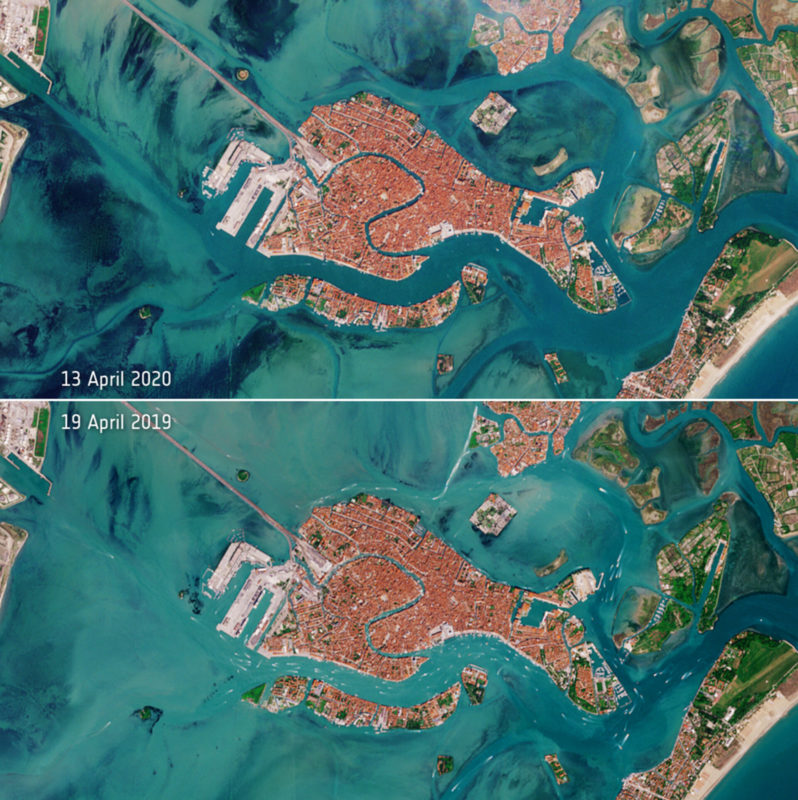Our way of life has been altered in every sense of the word. We are shifting how we conduct ourselves on daily basis when it comes to medical, social and economic matters.
We are wearing masks and practicing healthier hygiene etiquettes. We are working remotely, reducing commuting to a bare minimum and interacting with others from a distance.
We are conducting business as usual, unusually.
It’s easy to point out COVID-19 has upended our lives and changed virtually every aspect of how we work, live and interact. Granted, as a species, we are wary of change and act accordingly.
Yet, in spite of our instinctual response to change, there are some curious and unexpected positive side effects to the pandemic-induced shifts in our behaviour.
Let’s take a quick peek under the dark veil of COVID-19 and allow ourselves a moment to take in the positives:
Environmentally
The planet is reaping most of the rewards from our behavioural changes. The sky is bluer, water is clearer, fewer cars are crashing and traffic is at a good kind of standstill.
NASA satellites recorded an all-time low air pollution and CO2 emissions since World War II. There’s a significant pollution reduction of 20 to 30 per cent in major cities, which ultimately is correlating to significant health benefits.
The ozone layer is recovering fast and reducing global warming effects on the atmosphere, thanks to lockdown.
Cleaner beaches and oceans, as a result of the social distancing measures, is allowing the critical survival of coastal communities and ocean life.
For the first time in decades, you can see clearly through the waters of Venice. With the decrease in boating activities, gondola traffic and treading of waters, the sediment is remaining at the bottom of the canals and allowing a crystal clear view around the city.

Reports of traffic volume falling by 55 per cent is yielding results of fewer trauma-related admissions to hospitals. This reduction in traffic accidents is unparalleled, with an estimated $40 million in public savings every day, according to the director of the Road Ecology Center at the University of California.
Moreover, a notable reduction of environmental noise levels is apparent. Noise from industrial and commercial activities, the sound of engine vehicles and melodies at high volume all used to cause health problems and disruptions in the environment.
Its decrease is positively affecting overall population health and preserving natural conditions of the ecosystems.
Economically
A new wave of online tools and software is experiencing an all-time-high demand.
The increased need for platforms to connect with others and continue working remotely is sky-rocketing revenues and profits for IT companies. This demand will grow the industry and create jobs for generations to come.
This demand is also transforming the image of remote work from millennial tech start-up to a mainstream option for many organizations.
The pandemic proved it is possible for people to work from home and conduct business with few interruptions.
Being mandated to work from home showed companies the reality of the benefits of remote work, and many are now downsizing on their real-estate due to the decreased need for office space and facilities. They’re saving on rent, bills and overhead expenses.
This decrease is making real estate affordable in major cities.
Moving to different cities is no longer necessary for job opportunities. Alternative office spaces and working from home are allowing talent recruitment to go beyond postal codes, creating value for rural areas as well as urban.
Medically
A number of infectious diseases (excluding the coronavirus) are not as frequently treated at hospitals and emergency departments.
A sharp decline in disease such as influenza, respiratory viruses and human illnesses has been noticed by medical professionals all over the globe.
This nosedive decline is directly related to the newly-emphasized and improved hygienic practices: hand washing and covering of coughs or sneezes.
Socially
We are building and better maintaining genuine relationships. Less frequent excursions outside of our homes and more time spent inside with loved ones are offering us that privilege.
Families and friends are coming together to enjoy quality interactions.
Less time spent getting ready in the morning and commuting is more time allotted to thinking and reflecting. We have the opportunity to mentally recharge without the pressures of social obligations, impending deadlines and day-to-day expectations.
Less busy schedules with less running around for errands or rushing to urgent meetings.
We can do a number of our daily tasks from the comfort of home.
In a time of financial uncertainty for so many, it’s more than fair that we focus on the large-scale social and economic changes our world needs.
To realize the way our world was operating needed an abrupt change IS in fact a positive. Let’s give ourselves a daily break to breathe and self-reflect on what has changed for us, what is yet to change, and which changes can propel us forward.
We will learn from this pandemic and use it to rebuild, refocus and make global changes. We can look at this year of constant change and start planning for a better future.
< Back to Articles | Topics: Working for you

